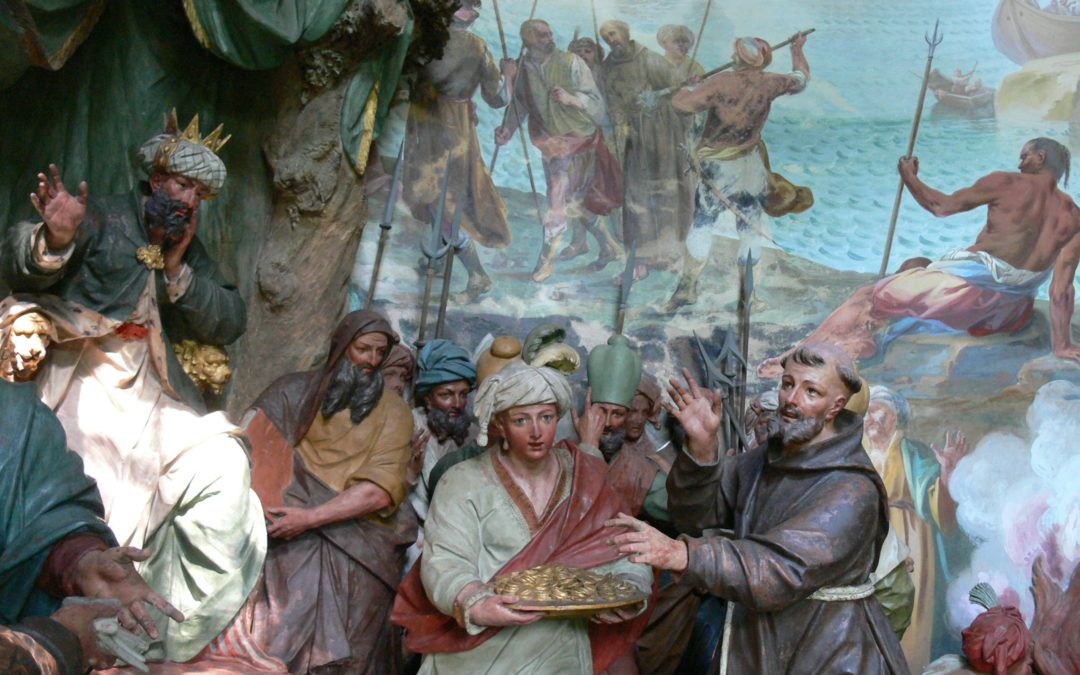When the episode in the life of Francis related to his encounter with the Crucifix of San Damiano, and the task with which he was entrusted, “Go and rebuild my house which is falling into ruins”, is raised, almost always if not always, there is a reference made to the fact that the Church of that time, at least in respect of the temporal power it wielded, lived in luxury and was certainly not an example of integrity and in keeping with the Word which it was announcing.
What is not mentioned, however, is the problem of violence, which was very common in the Middle Ages and involved all levels of society, and thus, also the Church. The dominant culture celebrated a style, the style of chivalry, which was a model that was aimed at and imitated.
Whatever dispute or conflict found its solution not in dialogue or agreement, but in an armed confrontation that necessarily concluded with a victory for one side and defeat and annihilation for the other. The Church and the Empire were an example of this type of situation. It was almost self-evident that whoever could go armed and learn the use of arms and the relevant knightly code should do so. Francis himself, whilst a young man, dreamed of being a knight and of covering himself in glory on the battlefield.
His first meeting with hard reality came in the battle of Collestrada which recalibrated the romantic aspect when confronted with his concrete first-hand experience of raw hand to hand fighting and finding it necessary to kill in order not to be killed. His imprisonment in jail must have been terrible, and for what must have seemed an interminable year he had to reflect on the fact that his friends and companions had been killed while he because he was rich, was spared so that his family may pay a ransom.
All of this marked Francis deeply and was the point of departure for his conversion that the encounter with the leper and the episode with the Crucifix illuminated with new and profound meaning.
He was to embrace Lady Poverty directly as a result of these episodes, a poverty understood as the search for and proposal of a new model of society that refuted money, which was used by the powerful as a means of subjugation and power, and recognized the dignity of all creatures, inasmuch as they were parts of creation designed as a universal fraternity.
And if all are brothers and sisters, creatures of God and his gift – and remember that he wrote in his testament: The Lord gave me brothers – then it must be the law of love and not violence and weapons that must rule the world. Francis, a down to earth man, realized this model in the fraternity that he suggested and lived.
But as we said this was a very violent period and one which saw the maximum engagement of the Church and the Catholic world in the Crusades, wars unleashed against Muslims which, with the motivation of the re-conquest of the Holy Sites covered other aims of territorial expansion, the dominion of the seas and economic profit.
The language that was used to motivate persons to adhere to the call is violent and raw and precisely the opposite of that which Jesus proposes in his Holy Gospel and lives in his death on the cross. The “Quia Maior,” the bull by which Pope Innocent III called for the Fifth Crusade, the one in which Francis would go to Damietta, promises the cross of glory and eternal salvation to those who go to battle and to kill heretical enemies and eternal damnation to those who refuse to do so. The battle becomes the test of one’s faith. The bull dwells a lot upon other similar motivations similar to this thesis, defining Evil in terms of the enemy and Good in terms of the Crusaders.
This reading and comment on it may be worthwhile, but they are not the subject of this reflection.
We are clearly on a different plain as to what Francis is writing about in the Canticle of the Creatures.
It is in this context that the message of brotherhood espoused by Francis and his presence at the crusades in Damietta, which the film the Sultan and the Saint analyses with a “modern” outlook digging in to the various psychologies of the protagonists and deepening their understanding by looking at all the contemporary documents and not just the hagiographical lives of Francis to discover a fundamental event in his journey of faith which was misunderstood for many years.

It was at Damietta as well in the crusaders camp that Francis decisively refuted violence and invited the soldiers not to fight, whilst on the other side Sultan Malek al-Kamil also wanted to avoid bloodshed by proposing a peace which would give the Christian army Jerusalem and the holy places. Commercial interests induced the papal legate, commander in chief of the expedition, to refuse the proposal leading to defeat and the fall of Damietta and Cairo being surrounded. The defeat is rendered even more dramatic for the Christians when they find themselves stranded in a flooded marsh in which they had no way of defending themselves and were open to extermination only to receive from those which the Bull had described as “beasts, devils and contemptible beings” bread, water and forage for their animals up until the point they could recommence their journey and retreat.
These scenes form the background for the encounter between Francis and Malek al-Kamil, a meeting of faith, listening and reciprocal respect: a model for us in making contact with other cultures and religions.
To underline how listening and dialogue are fundamental, all researchers are in agreement in declaring that the faith and spirituality of Francis were reinforced and fulfilled by this encounter.
What was written by him after the return to Damietta is significant in this regard. The statements which we find in the Earlier Rule, in the letter to the Rulers of the Peoples, in the letter to a Guardian or even in the Praises to God the Most High, would not have been possible without this encounter and dialogue.
These are only some points which may provide food for thought and an invitation to study the matter more profoundly but they are above all an invitation to continue to live the instruction which Francis left us in an article of the Earlier Rule: …Let them not engage in fights or disputes but let them be subject to every other human being for the love of God, and let them declare themselves to be Christians… May the Lord give you his peace!
Attilio Galimberti, OFS
Romans VI – Milan

